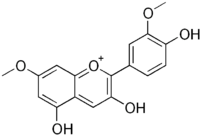Rosinidin
From Wikipedia, the free encyclopedia
| Rosinidin | |
|---|---|
 | |
| IUPAC name 2-(4-Hydroxy-3-methoxyphenyl)-7-methoxychromenylium-3,5-diol | |
| Other names 2-(4-Hydroxy-3-methoxy-phenyl)-7-methoxy-chromene-3,5-diol | |
| Identifiers | |
| CAS number | 4092-64-2 |
| PubChem | 441777 |
| ChemSpider | 390373 |
| Jmol-3D images | {{#if:COC1=CC2=[O+]C(=C(C=C2C(=C1)O)O)C3=CC(=C(C=C3)O)OC|Image 1 |
| |
| |
| Properties | |
| Molecular formula | C17H15O6+ |
| Molar mass | 315.30 g/mol |
| Except where noted otherwise, data are given for materials in their standard state (at 25 °C (77 °F), 100 kPa) | |
| Infobox references | |
Rosinidin is an O-methylated anthocyanidin. It is a pigment found in the flowers of Catharanthus roseus[1] and, in lower concentration, in Primula rosea.[2]
References
- ↑ Toki K, Saito N, Irie Y, Tatsuzawa F, Shigihara A, Honda T (March 2008). "7-O-Methylated anthocyanidin glycosides from Catharanthus roseus". Phytochemistry 69 (5): 1215–9. doi:10.1016/j.phytochem.2007.11.005. PMID 18164044.
- ↑ The Structure and Distribution of the Flavonoids in Plants. Tsukasa Iwashina, Journal of Plant Research, 2000, Volume 113, Number 3, pages 287-299, doi:10.1007/PL00013940
External links
| ||||||||||||||||||||||||||||||||
This article is issued from Wikipedia. The text is available under the Creative Commons Attribution/Share Alike; additional terms may apply for the media files.